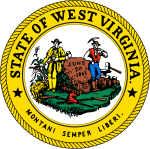| ||||||||||||||||||||||||||||||||||||||||
18 of 34 seats in the West Virginia Senate 18 seats needed for a majority | ||||||||||||||||||||||||||||||||||||||||
|---|---|---|---|---|---|---|---|---|---|---|---|---|---|---|---|---|---|---|---|---|---|---|---|---|---|---|---|---|---|---|---|---|---|---|---|---|---|---|---|---|
| ||||||||||||||||||||||||||||||||||||||||
Holds and gains: Democratic gain Democratic hold Republican hold
Circular inset (SD 10): both seats up for election | ||||||||||||||||||||||||||||||||||||||||
| ||||||||||||||||||||||||||||||||||||||||
| Elections in West Virginia |
|---|
 |
The 2010 West Virginia Senate election took place on Tuesday, November 2, 2010, to elect members to the 80th and 81st Legislatures; held concurrently with the U.S. House and U.S. Senate elections. [1] State senate seats in West Virginia are staggered, with senators serving 4-year terms. 18 of the 34 state senate seats were up for election. 17 were regularly scheduled, with an additional special election in SD 10 after the death of Donald Caruth on May 1, 2010. John H. Shott was appointed to fill the seat, and Mark Wills was elected to finish the term. [2] While Republicans made huge gains across the country, [3] Democrats did well in the state senate, picking up two Republican seats. [4]



